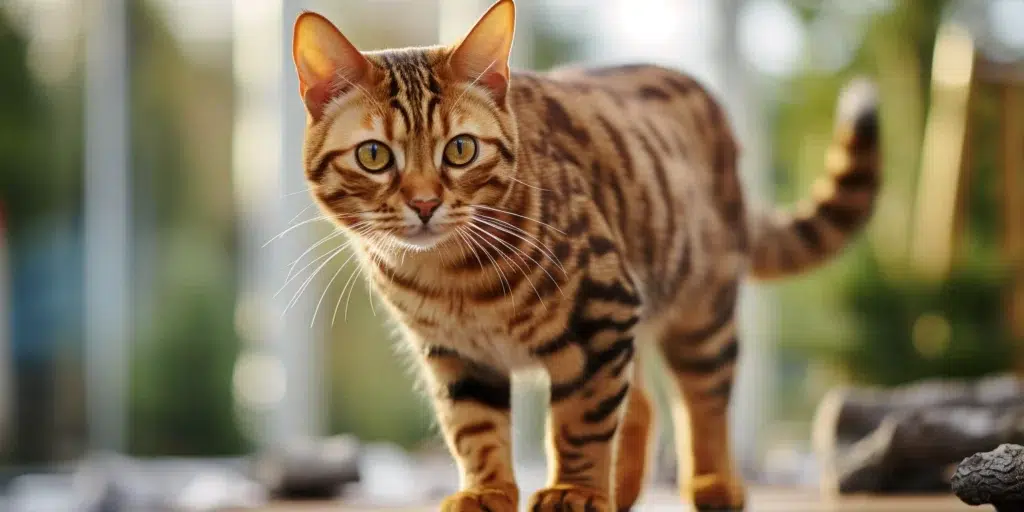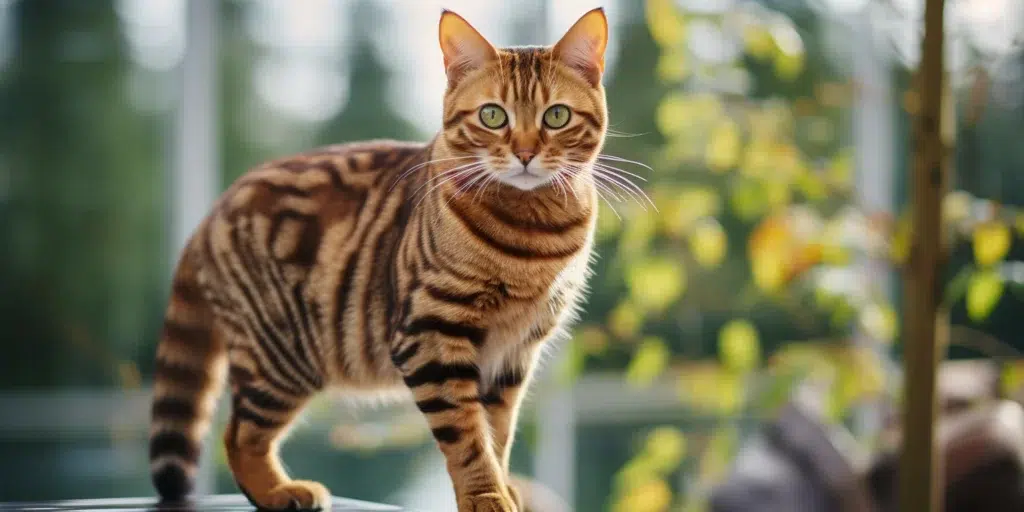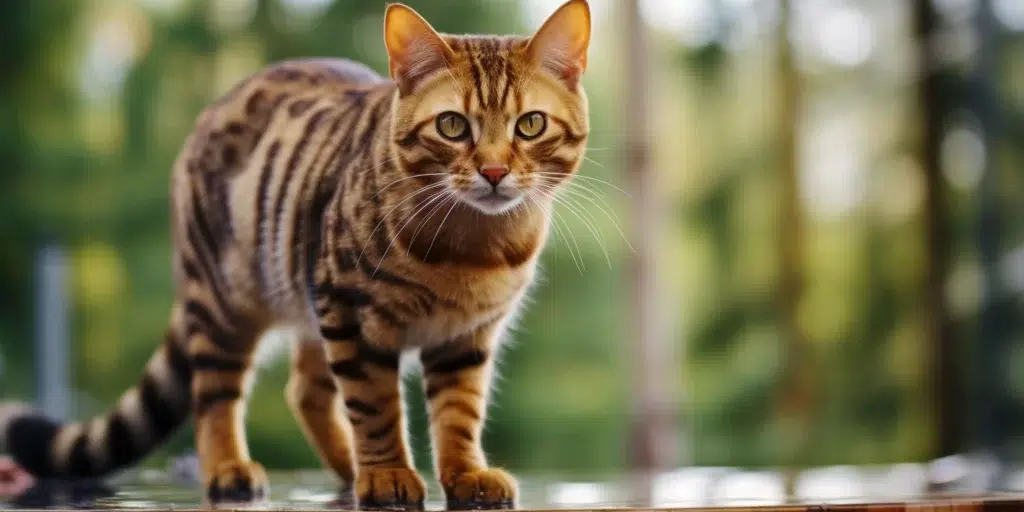The Toyger is an enchanting domestic cat breed that brings the majestic beauty of wild tigers into your home. These little tigers are perfect for people who want to add a touch of exoticism to their spaces, thanks to their friendly dispositions, rolling gait, and striking stripes.
A Toyger’s health and happiness depend on the amount of human connection they receive. Just like other cats, they enjoy petting themselves on the head or getting their chins scratched.
Keep in mind that these felines may exhibit certain tiger-like traits and appear wild, but they are actually completely tamed cats who depend greatly on humans for company.
So keep reading to discover how to be the ultimate Toyger parent!

Breed Overview
The Toyger is a relatively new cat breed that was developed in the United States. The name “Toyger” comes from its distinct appearance, which resembles a tiger’s.
Their name comes from a combination of the words “toy” and “tiger,” which perfectly describes the playful yet majestic appearance of these cats.
Lady Sugden chose to create this one-of-a-kind feline in the 1980s by crossbreeding a Bengal named Millwood Rumpled Spotskin with a domestic shorthair named Scrapmetal.
She also included some genes from a street cat from Kashmir, helping to bring out the distinctive tiger-like stripes that are seen on Toyger cats today.
After several generations, her efforts were finally recognized when the International Cat Association (TICA) officially registered them as an official breed in 1993.
Since then, these gorgeous felines have become popular pets around the world due to their intelligence and loyalty towards their owners. They are also known for being very active and love chasing after toys or playing hide-and-seek games with their humans!
Though the toyger is not related to tigers genetically, it does share some of their physical traits, which makes it an incredibly unique pet for any home.
Identifying A Toyger Cat
The Toyger is a medium-sized breed of cat with an unmistakable coat pattern that resembles that of a tiger. They have long, deep, rectangular bodies and big bones with high shoulders, which give them the rolling gait of large wild cats.
Their coats are normally short but thick enough to require little grooming—just a regular brushing should suffice! The unique coat patterns consist of broken, or branched, bold vertical stripes in a random pattern along with rosettes stretched vertically.
Colors are typically dark markings on vivid orange backgrounds on the top portions of the cats, paired with white ground-color undersides and insides.

The coat pattern of a toyger is both distinctive and beautiful, with variations in hue from rusty orange to deep golden brown and dark stripes that resemble tiger stripes on the back. White or pale pink may be seen on the belly, legs, and faces.
Toygers can also be found in a variety of coat colors, including various shades of black, grey, red, and cream; their markings become more noticeable and practically painted-on as they get older, adding to their allure.
Personality Traits
The Toyger is an intelligent, friendly, and outgoing cat that loves people and other pets. They are easy to train and can learn tricks like walking on a leash or playing fetch.
They have laid-back personalities that make them easy to live with, providing their owners with a sense of taming the wild. They are affectionate cats that enjoy spending time with their owners.
The Toyger gets along well with most household pets, including cats and dogs. However, it is important to keep an eye on their early interactions with new animals to make sure they do not make anyone else nervous.
With early and consistent socialization and training, this affectionate breed will prove itself time and again as a devoted companion who will enrich your life with companionship and happiness.
It is helpful to provide treats or rewards during these interactions to let them know they are doing a good job!
Activity Level
Toygers are an energetic and clever breed of cat that make excellent pets for people with an active lifestyle. This breed requires regular exercise to maintain their physical and mental health.
This can be done through the use of cat exercise wheels, games such as puzzle toys that reward with treats, or by playing with family members. Because these felines enjoy connecting with people, they require a lot of attention from their owners to keep them happy and pleased.
Toyger Cat Loyalty
Toyger cats are known for their loyal and playful personalities. They make wonderful companions, often forming strong bonds with their owners.
These cats love to spend time with their humans, playing games like fetch and cuddling on the couch while they watch television together. A Toyger’s mischievous streak is sure to keep you amused, so don’t be surprised if you find yourself laughing along with your cat during playtime!
Love Of Water
Toygers retain some wild traits, such as fear of water. However, some toygers like to play in water, and they may act like fishermen by watching water bowls or running water. This can be traced back to the Asian leopard cat, which enjoys playing in and drinking from streams and rivers.
Toygers enjoy playing and lounging in bodies of water, just like their wild counterparts, so supporting this behavior will improve your bond with them while also keeping them healthy and active.
Another thing to consider is taking your toyger to a nearby pond or larger body of water on occasion. This will give them the opportunity to get used to water or even swim!

Trainability
The toyger is an incredibly intelligent and trainable cat breed, capable of learning not just the most fundamental obedience commands like “yes/no” and “come,” but also more advanced maneuvers like fetching and retrieving objects.
Unlike some other cat breeds, toygers are usually eager to please their owners, which makes training them very straightforward. With patience and persistence, they can be taught a variety of tasks that make them quite interesting companions.
Toygers learn quickly, so positive reinforcement is preferable for teaching them tricks and orders. Playtime is important for training these cats since they adore exploring their environment. This will strengthen owner-pet ties and increase cerebral stimulation, which helps the animal develop.
Adult Size
The Toyger is a medium-sized cat that has a powerful and muscular body with an average height of 9–13 inches. Its body length can range from 20 to 24 inches, depending on the specimen.
When it comes to weight, male Toygers typically weigh 10 to 15 pounds, while females usually weigh 7 to 10 pounds. Even with this weight, because of their athletic build and strong legs, they can jump up to a meter high!
The growth rate of the Toyger Cat varies depending on the stage of life it is in. During kittenhood, these cats tend to grow quickly, with some reaching their adult size within just three months!
Once they reach adulthood at about one year of age, their growth rate gradually decreases, and they usually maintain a constant weight until they are seven or eight years old. This is when they may begin to gain a little weight.
As senior cats, Toygers can become quite inactive, and their appetite may decrease, which can lead to weight loss. Owners need to monitor their food intake and exercise levels so that any potential health concerns can be addressed early on.
Life Expectancy
The Toyger Cat is a breed of domestic cats that was developed to look like small tigers. They have an average lifespan of 10–15 years, which is longer than most house cats.
As kittens grow, it is important to keep your kitty active and healthy by giving them a balanced diet rich in vitamins and minerals. Encouraging them to play and explore their surroundings will also help them live longer.
Toyger cats, with the correct care and attention, may have long, happy lives full of affection. So it is important to make sure they get plenty of physical activity through play and walks outdoors.

Toyger Cat Care
Caring for a Toyger cat is a demanding but rewarding experience. As smart, athletic, and intellectual cats, these mixed breeds need plenty of physical and mental stimulation to keep them interested and happy.
It is essential to have a lot of safe climbing toys or cat trees available. Interactive toys are fun for cats and help keep their minds engaged.
Also, make sure to check the ears often for signs of disease or dirt buildup; if needed, clean the ears after consulting with your vet about the best ways to handle the situation.
It is recommended to start brushing your cat’s teeth regularly, following your vet’s instructions, as soon as possible so that it becomes habitual and helps maintain their teeth clean and healthy.
If you want to take your Toyger outside, make sure you use a safe leash and harness for supervision at all times.
Taking care of a Toyger cat requires daily dedication and patience, but the rewards are worth it. Regular vet checkups and weekly nail clipping are recommended for good health.
With proper dieting, daily exercise routines, and regular grooming habits implemented into the routine you will have one incredibly happy feline family member!
Diet
Toygers require a complete and balanced diet to support their active lifestyle. Wet food or canned cat food provides the necessary moisture that cats need, as well as essential nutrients like proteins, fats, carbohydrates, and vitamins.
Toygers’ oral health is also influenced by the dry kibble they eat. High-quality dry kibble should have a lot of protein-based ingredients, excellent fats, and complex carbs and very few plant-based ingredients.
When choosing a cat food for your Toyger, it is vital to take into account their age, activity level, and any specific nutritional requirements. It is also wise to avoid wet and dry diets that contain artificial preservatives, fillers, or byproducts. These can lead to long-term health problems for cats.
In addition to ensuring their daily nutritional requirements are met, it is also beneficial to provide supplements such as omega-3 fatty acids, which promote skin and coat health; probiotics, which help aid digestion; and glucosamine and chondroitin sulfate, which help maintain joint mobility.
Your veterinarian is the ideal person to ask for advice on a healthy diet for your pet if you feel unsure about what to feed them.
Toyger cats, like all felines, require water for proper hydration. It is important to offer Toyger cats clean water daily. Because Toyger cats have sensitive noses, it is recommended to keep their food and water bowls at least three feet apart to avoid strong odors that could make them not want to drink.
Toygers may also be motivated to drink more by the visual and auditory stimulation of a running or filtered fountain. Overall, proper hydration plays a key role in maintaining good health for your cats.

Exercise Requirement
Toyger cats are characterized by their stocky, muscular bodies and tiger-like appearance; however, despite their muscular appearance, they require a lot of physical and mental stimulation to thrive.
There is no cookie-cutter method for making sure your Toyger gets plenty of activity on a daily basis; although some cats thrive on playing outside, others do better with indoor toys like climbing structures or scratching posts.
Your feline friend needs plenty of time playing, running, jumping, or anything else it enjoys to get its daily dose of excitement and enjoyment. Not only does regular exercise help keep your cat fit physically, but it can also help reduce stress levels and promote overall mental wellbeing too!
Shedding Levels
Toyger cats are known for their beautiful tiger-like coats, but they do tend to shed quite a bit. To keep the shedding under control, weekly brushing is recommended. Not only does this help with the fur, but it also helps build a bond between you and your pet.
However, their shedding level does depend on the stage of life they are in. As kittens, Toygers do not require much brushing. but after 4-5 months of age, they will start to shed heavily until they reach their full mature body.
In adulthood, their coats will have shrunk in length, but they will continue to shed, so regular brushing is required. Brushing your cat’s fur on a regular basis will make it look healthy and cut down on shedding.

Health Issues
When it comes to health issues, Toygers are relatively healthy and not overly prone to any particular diseases or illnesses compared to other breeds of cats. However, some common ailments may affect them like any other breed.
The most common diseases include:
- upper respiratory infections
- eye problems
- heart disease
- kidney disease
An unhealthy diet and living conditions can have numerous negative effects on a Toyger cat’s health. If the cat is not getting enough to eat, it might develop malnutrition, which makes it less immune and more likely to get sick.
Similarly, cats kept in unclean environments are at an increased risk of contracting bacterial or viral infections as well as parasites such as fleas and ticks.
To prevent diseases and keep your Toyger cat healthy, it is important to provide them with quality food formulated specifically for their needs. Additionally, regular veterinary check-ups should be scheduled to monitor their overall health status.
Cleaning litter boxes regularly and providing plenty of fresh water will also help maintain the cat’s well-being by reducing exposure to harmful bacteria that may cause illness.
Buying Tips
- Check the kitten’s health: Before you buy a Toyger Cat, make sure to have them checked out by a vet. Look for signs of good health and proper nutrition.
- Research the breeder: Make sure that the breeder is reputable and has experience breeding Toyger Cats specifically. Ask questions about their breeding practices and how they care for their cats before making a purchase decision.
- Look at temperament: Be sure to pay attention to the kitten’s personality when meeting them in person or online; they should be friendly, outgoing, and inquisitive! Avoid any kittens that seem overly shy or aggressive, as this could lead to behavior problems down the line.
- Consider age: Kittens tend to adjust better than adult cats when it comes to adjusting to new homes, so if possible, try to get a younger cat (6–8 months old). This will help ensure your Toyger cat is well-socialized from an early age, which can help reduce stress levels later on in life!
- Get all paperwork: When purchasing your Toyger Cat, make sure you receive all necessary paperwork, such as registration documents with information about its lineage and vaccination records, from the breeder beforehand so it can be transferred over upon purchase.
You Might Like: 250+ Amazing Toyger Cat Names & How To Select One!

Conclusion
If you’re looking for an intelligent, active, and unique pet that will be a source of joy and companionship for years to come, then the Toyger Cat is an excellent choice. These cats have been carefully bred to look like miniature tigers, making them stand out from other breeds.
With their playful personalities and loyal nature, these cats make great companions for those who are willing to provide them with the love and care they need. Toyger Cats are also generally healthy and require minimal grooming, making them ideal for busy households or people who don’t have much time on their hands.
All in all, if you want a special pet that can bring joy into your life while also providing plenty of loyalty and affection – the Toyger Cat is worth considering!